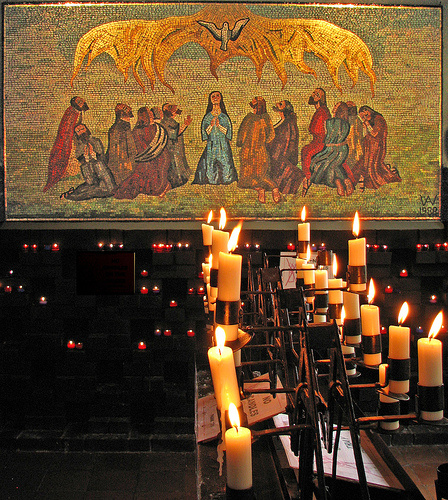I remember attending Christian retreats/festivals/revivals/conferences. These were much-loved quiet times of reflection, a time to spend in unabashed and unashamed camaraderie with fellow believers. More importantly though, they always had great music. I knew without a doubt that the evenings would be intense. It would be a kamikaze of blue lights, key changes, tears, sweat, and a 23 minute rendition of Michael W Smith’s Let it rain. It is a collusion of blood, bone and brain matter; fused with flickering lights, heat, glowsticks and D-chords. The synapses are firing. The skin is getting prickly. It leaves people on their knees, chest heaving and body crumpled on the floor because they could not stand the weight of the glory of God in the room. The air get thick with it, and it invariably becomes more than people’s hearts can bear.
In the aftermath, in the stillness, we would reflect on the experience as we rode home in the dark in buses and vans. It was a quiet time of holy reverence for what we had just gone through. As we came out of our shells and began to talk, we would always agree on the same thing, that the music was awesome and that “God showed up.” Later on during the next morning service, the Pastor would call up one or two of us teen representatives on stage to talk about our time there. We would invariably share the same thing, that it was a fantastic life changing experience, and that ” God showed up”.
But why did we say that? Its because since we were young, we’ve been conditioned by the Church and the purveyors of modern evangelicalism to believe that emotional experiences are equated to a spiritual experience. That they are interrelated and interchangeable. That if you have an emotional response to a song or to an atmosphere, that God is there and at working. I can’t remember a time when that wasn’t taught, either explicitly or tacitly. They might not outright say it, but their actions scream it. Music is a powerful thing, all the much more when it is consecrated with the Holy Spirit and imbued with spiritual words and meaning. That’s why our teens can remember how they felt every single time at every conference, but can’t tell you what was preached on. They could walk someone through minute by minute of a two hour worship set during certain retreats, but couldn’t tell you what scriptures were preached on for the 15 minutes afterward.
Do I think God shows up? Absolutely, but listen- he ALWAYS SHOWS UP. God is there at every Church service. Every prayer group. Every congregational meeting. Every Bible study. God is there and has shown up, and he has shown himself relentlessly faithful to do so. He is an omniscient, omnipresent deity whose Spirit lives inside of us, present in nearly every way possible as we gather together as believers and as his children. It is a wonderful, beautiful and precious thing, and yes, that can be an emotional thing. But he is never far from us. So why is it I’ve never heard anyone say that God “really showed up” during a Bible study through the book of 1 Samuel? Why is it that no one says that God “showed up” during a Sunday school lecture on the penal substitution atonement? Why is it that no speaks in hushed tones about God “showing up” at the annual general meeting?
Why is it that God only “shows up” when we’re jumping up and down with arms raised? Why does he only “show up” when our hearts are beating fast and when we’re engulfed in a heightened emotional state? Is it a more powerful manifestation, or a more palpable iteration? These artificial distinctions are made when there is no objective basis for doing so. I’ve heard some of the most idolatrous, blasphemous things said at certain conferences where God “really showed up”. I’ve bit my lip during certain songs that contained the most vilely irreverent lyrics where God “showed up”. I’ve heard heretics bastardize the scriptures and manipulate them into every theological grotesquerie at retreats where God really, really “showed up”. What has “showing up” come to mean?
There is so much emphasis on getting people to this emotional state and then constantly reinforcing the meaning and significance of this state. This is detrimental to our souls and only serves to weaken the body. Despite this, vast amounts of money, energy, and ministry resources are dedicated to creating occasions where people can have these experiences. Its not just conferences and retreats, but also Wednesday night worship nights which promise “Come have an intimate night with the Lord and have him show up” Are these experiences spiritual by virtue of their very existence? How can this constant reinforcement of “experience = meeting God” be healthy for anybody who wants to grow and be sanctified? How can it produce thoughtful, reasonable, mature men and women of God? What happens when the thrill, the flush and the buzz go away? What theological monsters and biblical confusions are being created in the mind of a man who can’t distinguish them, and in fact doesn’t want to? What happens when they get tired of chasing the high and come to the conclusion that loss of experiential high means that they’ve been abandoned by God? That the burnout means that God is no longer showing up? That he is no longer there and probably not even real because he wouldn’t abandon them so. That the angst and terror of depression and spiritual desolation is proof positive that they’ve been severed from Christ and betrayed by His love and grace?
What happens then? Will God “show up” or will He show up?
[Contributed by Dustin Germain]











